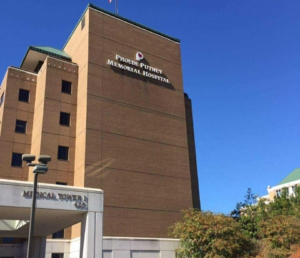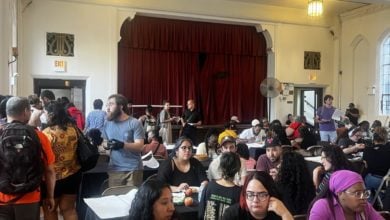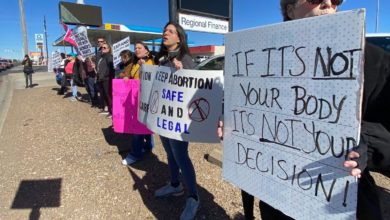
As the COVID-19 pandemic continues to intensify, poor and oppressed communities will be the hardest hit. This can be seen in Albany, a city of approximately 70,000 people in Southwest Georgia. As of April 17, there have been at least 2,030 confirmed cases, making Albany a city with one of the highest number of coronavirus cases per capita in the world. Additionally, the 78 deaths in Dougherty County, of which Albany is county seat, are the most of any in Georgia. The outbreak has completely overwhelmed the regional healthcare system, which serves over 14 counties in Southwest Georgia. Nurses in the region have been ordered to continue working even if they test positive for the virus.
What is happening in Southwest Georgia?
When the coronavirus outbreak began to spread in China back in December, Phoebe Putney Memorial Hospital, the only major hospital in Dougherty County, began stocking up on personal protective equipment and supplies. Once the outbreak eventually reached South Georgia, the hospital began seeing a massive influx of coronavirus patients. Supplies were exhausted in only seven days and medical staff were tasked to make masks themselves. Soon after, the hospital reached maximum capacity and no beds were available in their ICU. Other hospitals in surrounding regions initially refused to accept coronavirus patients from Albany, but since then hospitals in Macon and Columbus have accepted patients in order to make room at Phoebe Putney. Unable to adequately respond to the outbreak, Phoebe Putney has even had to resort to an online donation campaign.
Two of the coronavirus deaths at Phoebe Putney Hospital included inmates at Lee County State Prison, located about 20 minutes from Albany. These inmates were transported to the hospital after their clinical symptoms worsened. Adding to the positive COVID-19 cases at Lee County Prison are nine staff members and seven other inmates. This outbreak puts the entire prison population in serious health risk considering physical distancing is impossible. Organizations such as The ACLU of Georgia and the Southern Center for Human Rights have called for medically vulnerable and non-violent prisoners to be released.
How did this happen?
Albany is located in the Black Belt, a geographical term that references a region in the Southeast United States with fertile soil. This fertile ground meant prime land for cotton plantations where slaves were forced to work. The term Black Belt has also taken on a more political definition — a region in which Black residents make up a majority. Approximately 73 percent of Albany’s residents are Black and 33 percent of the city’s total population live below the poverty line.
It has been well documented that African Americans nation-wide disproportionately lack access to resources, such as basic health care, preventative screenings, and nutritious foods, which plays a part in why poor Black Americans are more likely to suffer from chronic illnesses. Additionally, Black residents make up a disproportionate part of the essential workforce, and thus are less able to self-quarantine. All of these socioeconomic factors can exacerbate poorer health outcomes, and it comes of no surprise that Black Americans are now being hit the hardest during this pandemic.
Another reasons why the pandemic has hit the Southwest Georgia region hard is the fact that only one major hospital serves a large geographic area. Albany is the largest city in a radius of about 85 miles, nearly the size of West Virginia. The 14-county-wide region that Phoebe Putney Memorial Hospital serves comprises a population of approximately 500,000. In the past, other hospitals served the area, but have been bought out by Phoebe Putney over the years, including Palmyra Medical Center in 2010, leading to a virtual monopoly.
It goes without saying that Phoebe Putney’s 691 beds are not nearly adequate enough to serve not only the Dougherty County population, but much of the nearby communities as well. The U.S. already has less hospital beds per capita compared to many other Western countries, but this statistic is even worse in Southwest Georgia. With a low population density, high levels of poverty, and a for-profit healthcare system, the result is a critically underserved region.
The media response
Instead of holding socioeconomic conditions accountable, the mainstream media has decided to blame the outbreak in Albany on individual actions. Such criticisms include making disparaging comments towards residents who attended funerals and others who have not been able to self-quarantine. Rarely mentioned in the coverage is how the medical system was already ill-equipped to handle even the community’s most basic medical needs. Following the state’s failure to expand Medicaid in 2010 was a spike in closure of rural hospitals, which has only exacerbated the already lacking medical needs in the region.
Recently released county health rankings by the Robert Wood Johnson Foundation and the University of Wisconsin Population Health Institute ranks Dougherty County 152 out of 159 Georgia counties. The healthcare system in Southwest Georgia does not have the capacity to respond to a pandemic, no matter the individual actions of the Albany population. Rather, the discussion should be shifted to how this outbreak has served to highlight the state’s systemic failures in serving its most vulnerable populations. Free and accessible healthcare would ensure that all Georgia residents receive adequate treatment no matter their profitability.
Liberation News reached out to staff at Phoebe Putney Hospital for an interview but the staff has been advised to not speak to any news or media source.






